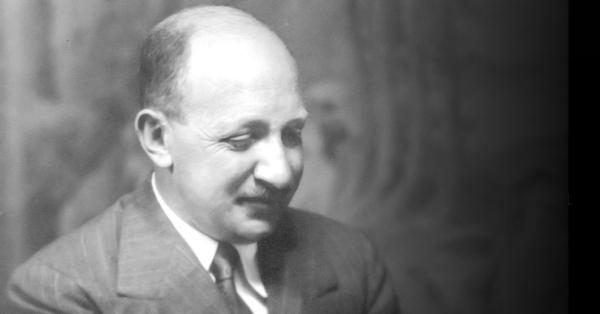REDISCOVER Frederick Jacobi: In Search of Culture and Clarity

October 09, 2018
Among the 200 composers in the Milken Archive are many whose music has lived and breathed primarily within the circumscribed world of Jewish culture—solid, capable composers who did not achieve fame or recognition in the general music world. There are giants among them as well: the Bernsteins, Blochs, and Schoenbergs who have left an indelible mark on the history of music while also contributing works of specific Jewish connection. A third category might be somewhere in between. They are the composers who were well known and influential in their time, but who have been all but forgotten today.
To this category belongs Frederick Jacobi (1891–1952), a San Francisco-born composer with scant formal Jewish educational or religious background. Though he eschewed many of the music trends of his time, even describing himself as an “anti-obscurantist,” Jacobi became one of the top American composers of his era.
“Frederick Jacobi had a big reputation,” remarked David Diamond, a leading composer of the subsequent generation, in a Milken Archive oral history session. “I would say [Walter] Piston, [Randall] Thompson, Jacobi.”
From San Francisco, Jacobi went to Europe and New York and studied with some of the most important composers of the elder generation, Ernest Bloch among them. Later, through his own teaching at Juilliard, he influenced many leading composers of the subsequent generation. Jacobi also harbored an intense interest in Native American music, and once spent an entire winter among the Navajo and Pueblo tribes of the Southwest. Native American themes are prevalent throughout much of his early work.

Frederick Jacobi was a saxophonist in the U.S. Army Band. He never played the instrument but he was ordered to play when the recruiting officer discovered he was a musician.
But a 1930 commission from Lazare Saminsky and Temple Emanu-El in New York had a profound effect on a composer already well established and possessing of a fine reputation. Noted Neil W. Levin in his biography of Jacobi for the Milken Archive:
[T]he Temple Emanu-El commission . . . had a lasting influence on Jacobi and literally changed his life, triggering his Judaic curiosity and launching a spiritual as well as cultural consciousness, which he then merged with his creative quest.
Over the following two decades, Jacobi explored Jewish musical and heritage in several works which the Milken Archive has recorded for the first time.
Sabbath Evening Service, the commission that instigated Jacobi’s interest in matters Judaic, was actually completed while he was living in Switzerland. Among its unique qualities is the fact that it was composed a cappella. Another is his treatment of the mi khamokha, as Neil W. Levin observes: “Jacobi has interpreted the Israelites’ response to God’s parting of the Sea of Reeds in their escape from ancient Egypt as an expression of almost hushed awe and reverence for God rather than a boisterous celebration.” Two Pieces in Sabbath Mood, an unpublished work from 1946, is a two-movement tone poem depicting the tranquility and joy of the Sabbath.
A piano quintet titled Hagiographa based on prominent characters from the Hebrew Bible (Job, Ruth, and Joshua) was composed in 1938 on commission from Elizabeth Sprague Coolidge. Here, Jacobi sought to imbue each movement with a distinct character: the first is dramatic and intense, the second is idyllic, and the third is triumphant. Coolidge was a highly influential patron of chamber music. That Jacobi was among such giants as Barber, Bartok, Stravinsky, and Ravel to have received a Coolidge commission speaks to the stature he held at the time.
Shortly after the Temple Emanu-El service premiere, Jacobi began composing a Concerto for Cello inspired by the Book of Psalms. The concerto received its premiere in Paris in 1933, played by cellist Diran Alexanian and conducted by Alfred Cortot at the École Normale. Deeply melodic and tuneful, the concerto reflects Jacobi’s stated aim “to write music which is clear, definite, and concise.”
He clarified a bit further, offering that “music should give pleasure and not try to solve philosophical problems."
